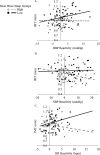Cardiovascular Stress Reactivity and Carotid Intima-Media Thickness: The Buffering Role of Slow-Wave Sleep
- PMID: 29381658
- PMCID: PMC5878122
- DOI: 10.1097/PSY.0000000000000560
Cardiovascular Stress Reactivity and Carotid Intima-Media Thickness: The Buffering Role of Slow-Wave Sleep
Abstract
Objective: Exaggerated cardiovascular reactivity to acute psychological stress has been associated with increased carotid intima-media thickness (IMT). However, interstudy variability in this relationship suggests the presence of moderating factors. The current study aimed to test the hypothesis that poor nocturnal sleep, defined as short total sleep time or low slow-wave sleep, would moderate the relationship between cardiovascular reactivity and IMT.
Methods: Participants (N = 99, 65.7% female, age = 59.3 ± 9.3 years) completed a two-night laboratory sleep study and cardiovascular examination where sleep and IMT were measured. The multisource interference task was used to induce acute psychological stress, while systolic and diastolic blood pressure and heart rate were monitored. Moderation was tested using the PROCESS framework in SPSS.
Results: Slow-wave sleep significantly moderated the relationship between all cardiovascular stress reactivity variables and IMT (all pinteraction ≤ .048, all ΔRinteraction ≥ .027). Greater stress reactivity was associated with higher IMT values in the low slow-wave sleep group and lower IMT values in the high slow-wave sleep group. No moderating effects of total sleep time were observed.
Conclusions: The results provide evidence that nocturnal slow-wave sleep moderates the relationship between cardiovascular stress reactivity and IMT and may buffer the effect of daytime stress-related disease processes.
Figures

Similar articles
-
Relationship of short-term blood pressure variability with carotid intima-media thickness in hypertensive patients.Biomed Eng Online. 2015 Jul 24;14:71. doi: 10.1186/s12938-015-0059-8. Biomed Eng Online. 2015. PMID: 26204889 Free PMC article.
-
Is stressor-evoked cardiovascular reactivity a pathway linking positive and negative emotionality to preclinical cardiovascular disease risk?Psychophysiology. 2021 Mar;58(3):e13741. doi: 10.1111/psyp.13741. Epub 2020 Dec 5. Psychophysiology. 2021. PMID: 33278305 Free PMC article.
-
Metabolic and cardiovascular adjustments during psychological stress and carotid artery intima-media thickness in youth.Physiol Behav. 2012 Mar 20;105(5):1140-7. doi: 10.1016/j.physbeh.2011.12.012. Epub 2011 Dec 22. Physiol Behav. 2012. PMID: 22210396
-
Exaggerated blood pressure responses during mental stress are prospectively related to enhanced carotid atherosclerosis in middle-aged Finnish men.Circulation. 2004 Oct 12;110(15):2198-203. doi: 10.1161/01.CIR.0000143840.77061.E9. Epub 2004 Sep 27. Circulation. 2004. PMID: 15451789
-
Cardiovascular reactivity to psychological stress and carotid intima-media thickness in children.Psychophysiology. 2009 Mar;46(2):293-9. doi: 10.1111/j.1469-8986.2008.00776.x. Epub 2009 Jan 20. Psychophysiology. 2009. PMID: 19207200
Cited by
-
Understanding the roles of central and autonomic activity during sleep in the improvement of working memory and episodic memory.Proc Natl Acad Sci U S A. 2022 Nov;119(44):e2123417119. doi: 10.1073/pnas.2123417119. Epub 2022 Oct 24. Proc Natl Acad Sci U S A. 2022. PMID: 36279428 Free PMC article.
-
Interplay of Objective Sleep Duration and Cardiovascular and Cerebrovascular Diseases on Cause-Specific Mortality.J Am Heart Assoc. 2019 Oct 15;8(20):e013043. doi: 10.1161/JAHA.119.013043. Epub 2019 Oct 2. J Am Heart Assoc. 2019. PMID: 31575322 Free PMC article.
-
Does objectively-assessed sleep moderate the association between history of major depressive disorder and task-switching?J Affect Disord. 2020 Mar 15;265:216-223. doi: 10.1016/j.jad.2020.01.003. Epub 2020 Jan 3. J Affect Disord. 2020. PMID: 32090744 Free PMC article.
References
-
- Touboul PJ, Hennerici MG, Meairs S, Adams H, Amarenco P, Bornstein N, Csiba L, Desvarieux M, Ebrahim S, Hernandex-Hernandex R, Jaff M, Kownator S, Naqvi T, Prati P, Rundek T, Sitzer M, Schminke U, Tardif JC, Taylor A, Vicaut E, Woo KS. Mannheim carotid intima-media thickness and plaque consensus (2004–2006–2011). An update on behalf of the advisory board of the 3rd, 4th, and 5th watching the risk symposia, at the 13th, 15th and 20th European Stroke Conference, Mannheim, Germany, 2004, Brussels, Belgium, 2006, and Hamburg, Germany, 2011. Cerebrovasc Dis. 2012;34:290–6. - PMC - PubMed
-
- Nezu T, Hosomi N, Aoki S, Matsumoto M. Carotid intima-media thickness for atherosclerosis. J Atheroscler Thromb. 2012;23:18–31. - PubMed
-
- Van den Oord SCH, Sijbrands EJG, ten Kate GL, van Klaveren D, van Domburg RT, van der Steen AFW, Schinkel AFL. Carotid intima-media thickness for cardiovascular risk assessment: Systematic review and meta-analysis. Atherosclerosis. 2013;228:1–11. - PubMed
- Carpenter M, Sinclair H, Kunadian V. Carotid intima media thickness and its utility as a predictor of cardiovascular disease: A review of evidence. Cardiol Rev. 2016;24:70–5. - PubMed
-
- Lorenz MW, Markus HS, Bots ML, Rosvall M, Sitzer M. Prediction of clinical cardiovascular events with carotid intima-media thickness: A systematic review and meta-analysis. Circulation. 2007;115:459–67. - PubMed
Publication types
MeSH terms
Grants and funding
- R01 GM113243/GM/NIGMS NIH HHS/United States
- R01 MH029618/MH/NIMH NIH HHS/United States
- UL1 RR024153/RR/NCRR NIH HHS/United States
- R01 MH041884/MH/NIMH NIH HHS/United States
- R01 HL104607/HL/NHLBI NIH HHS/United States
- T32 HL007560/HL/NHLBI NIH HHS/United States
- T32 HL082610/HL/NHLBI NIH HHS/United States
- F32 HL137227/HL/NHLBI NIH HHS/United States
- UL1 TR000005/TR/NCATS NIH HHS/United States
- K23 HL118318/HL/NHLBI NIH HHS/United States
- R37 MH029618/MH/NIMH NIH HHS/United States
- R01 MH024652/MH/NIMH NIH HHS/United States
LinkOut - more resources
Full Text Sources
Other Literature Sources
Medical

